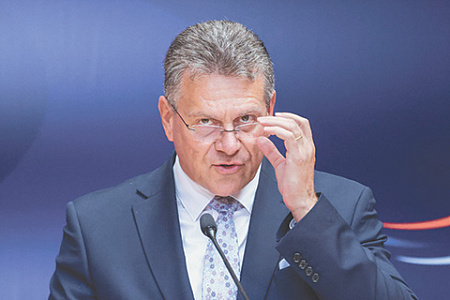
European Commissioner for Trade and Economic Security Maros Sefcovic said that a trade deal between Washington and Brussels should be concluded on the basis of “respect, not threats.” This was a response to US President Donald Trump’s accusations that the EU does not want to make concessions, and the White House’s threats to impose duties on all goods from the European Union in the amount of 50% from June 1. Brussels demonstrates that attacks from the White House are unacceptable and that Europeans are not satisfied with the policy of gross blackmail.
“The European Commission remains ready to work in good faith on the agreement. Trade between the EU and the US is exceptional and should be based on mutual respect, not threats. We are ready to defend our interests,” Sefcovic wrote on social media.
In fact, it was the European Commission’s response to Trump’s recent statements. The president claimed that the European Union was allegedly taking advantage of the United States, and accused it of having a negative trade balance of $230 billion. According to British media reports, over the past year, the United States has sold $370 billion worth of goods and services to EU countries, while Americans have bought $600 billion worth of goods and services from EU member states.
Since April, the United States has imposed 20 percent tariffs on most EU goods. However, they were then halved, leaving 25 percent tariffs on imports of steel, aluminum and auto parts.
European representatives complain that a trade deal requires de-escalation, rather than a continuation by the White House of the line of accusations against the EU. This motif is heard by several foreign ministers of European countries who commented on the situation.
Members of the Trump administration have a difficult relationship with Europe. In a high-profile Munich speech, US Vice President Jay Dee Vance criticized Europe for not meeting its own standards of democracy and freedom of speech and demanded that European countries contribute more to the defense sector. And the head of the Department of Public Administration Efficiency (DOGE), Elon Musk, almost openly interfered in the internal affairs of a number of countries, including Germany and the United Kingdom, trying to support the right-wing forces verbally and financially, which excited not only European politicians, but also residents.
Recall that on Friday, Trump announced that he “recommends” raising duties on European goods to 50% from June 1. He said the United States is ready to “start a game that they know how to play.”
With regard to Beijing, this approach has worked: Washington has managed to reach an agreement with the Chinese on mutual tariff reductions. However, in the case of the Europeans, Trump may encounter the same type of resistance that Russia has faced. The fact is that in some cases, the European Union may be guided by value motives in its decisions, even to the detriment of benefits. So, in a similar way, Brussels deliberately began to abandon Russian gas after the start of its This line was supported, among others, in Germany, which suffered more than other EU member states from the curtailment of energy cooperation with the Russian Federation.
At the same time, the White House does not like the format of delegation of authority itself, because of which Washington cannot negotiate directly with countries without publicizing a number of sensitive issues in an informal setting.
US Treasury Secretary Scott Bessent said in an interview with Fox News that a number of EU countries do not even suspect what topics representatives of the European Commission are negotiating with Washington instead of these countries themselves.
